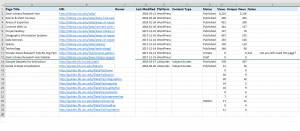Background
As a department, one of our primary responsibilities is ensuring that the University Libraries website contributes to providing a seamless library experience for all patrons. Though the User Experience & Assessment department oversees the large WordPress and LibGuides environments that make up our site, there are about 200 staff members and graduate students who regularly contribute content for pages, posts, and guides. Our four-person team couldn’t possibly create and maintain 700+ LibGuides and 400+ WordPress pages without the support of these contributors!
There are many ways we keep in touch with these stakeholders: a member of our content team provides basic training on WordPress and/or LibGuides to all new contributors, we maintain extensive documentation to assist with common questions, and we regularly communicate user experience- and content-related updates to library employees.
We’re also always looking for ways to streamline and improve our site and stakeholder communications. To that end, we began performing an annual content audit in December 2014—a process we have slowly revamped since the summer of 2016. This system means that we check in with every single one of our LibGuides and WordPress content owners at least once a year, and encourage them to review and update pages and guides that they’ve published. As part of the audit, we provide our content owners with basic information about every page and guide that they own: this includes names, URLs, visitor statistics from Google Analytics, and last updated dates.
The Process
The first step of this process begins in the spring: we first contact all site account holders to make sure they still work for Carolina’s Libraries and are engaged in maintaining their web content. If account holders still need their WordPress and LibGuides accounts, they simply have to fill out a very short form indicating this. Staff who don’t fill out the form or indicate that they are no longer involved in website maintenance are cleaned out from the system, with their content reassigned to a relevant library staffer. We began instituting this first step in 2017, and it has simplified the audit steps that follow.
After we have established our active users, we get to work compiling information about the content for which they are responsible. We first download spreadsheets listing published pages, posts, and guides from our WordPress and LibGuides systems; this includes information about content ownership and last updated dates. Once those spreadsheets are cleaned up and scrubbed of erroneous information, we start pulling usage statistics from Google Analytics. We like to provide our content owners with usage information on an academic schedule, so we start compiling Analytics for the previous year after the end of exams in the spring.
Changes Since 2016
We have communicated this information to our staff stakeholders in several different ways over the past few years, with varied levels of engagement. The first year current staff were responsible for the audit, in 2016, everyone received a personalized spreadsheet with their LibGuides data pulled from LibGuides. They also received a copy of a big spreadsheet with information about our entire WordPress environment alphabetized by owner name. We found that it was tricky for staff to have to reference two different documents to perform the maintenance that was asked of them. In addition, the reports generated within LibGuides contained more detail than was really relevant to content authors. As such, in 2017 we compiled information on both platforms into one large alphabetized spreadsheet to be sent to all stakeholders. This simplified how much information everyone received, but it was still a lot of information to throw at any individual author.
This year, we rethought our strategy again, and decided to break the large spreadsheet into individual reports for each library staffer. Though this required additional staff time, it meant that each recipient was sent information exclusively about their own content. We hoped this would diminish information overload and encourage content owners to review and update their pages and guides. We’ll check in in a few months to see how well this strategy worked!

Training
Inside the email that contains their reports librarians are provided a schedule of brush-up trainings on both WordPress and LibGuides that we offer over the slower summer months. Each year, we try to target these trainings to priorities of the University Libraries or to changes in the content management systems (e.g. LibGuides or WordPress). In 2017, our big focus was on accessibility. Staff were encouraged to attend a total of three training sessions to re-orient them to web accessibility standards in both WordPress and LibGuides. In 2018, we reiterated a lot of crucial accessibility information, but also focused on clarifying features of both platforms that tend to trip up our users. Staff attend either one or two sessions, depending on which system(s) they use.
New This Year
This year we also wanted to “clean house” as part of the audit. Many of our staff and student users create LibGuides with names like “Test page” when they’re first learning the platform. They also retain old LibGuides and occasionally save copies. Over the years, many dozens of these types of guides had accumulated in our system. We compiled a list of all of them and contacted all the owners about whether or not they were still in use: before we even began our formal audit, we were able to delete much of this outdated content. We plan to continue this maintenance every year from now on.
Next Steps
We’re always evaluating and improving our processes: we want them as streamlined and as useful to content creators as possible. We’ve learned a lot about wrangling our content over the past few years of audits, but we’d love to hear more ideas on how we can continue to iterate our system!
And if you want even more detail on our audits: Content Strategy Librarian Sarah Arnold and Content Management Research Assistant Claire Payne will be presenting on the evolution of our processes at the 2018 edUi conference in Charlottesville in October, 2018.